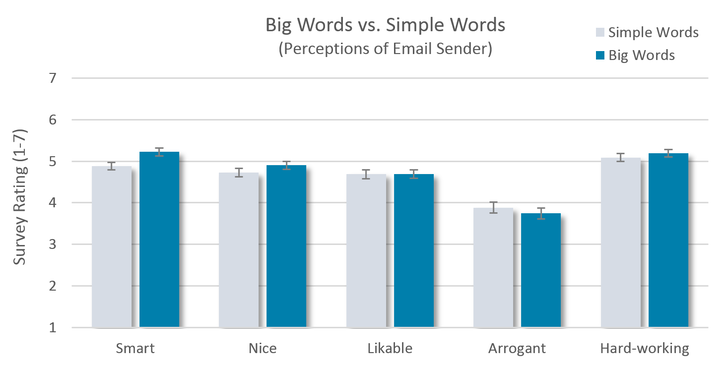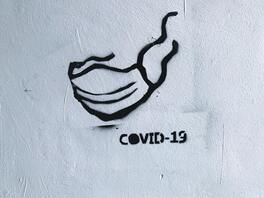Overview
The power of words extends beyond their role as communicators of information. Words can also convey a certain identity to others. If I use scientific words, perhaps I'm more likely to be a scientist. If I use slang or short-hand, perhaps I'm more laid back, or even lazy. Irrespective of how we feel about the words we use, others make judgments about our identities based on those words.
One particularly interesting exemplar of this phenomenon is the eloquent vocabulary. Or to put it bluntly, "big words." Learning them takes a good amount of motivation and memory, and a lot of colleges require their use in essays and papers. So maybe big words make us seem smart. But since most people don't use them, perhaps big words just make us seem stuck up.
So, is the use of big words the signature of the smart, or a pyrrhic victory for the pretentious? We put the question to the test in another riveting social experiment.
The Experiment
We had 400 people from Amazon MTurk participate in a survey experiment, a vignette scenario involving an email from a hypothetical new co-worker, Adam, that introduces himself using either big words or simple words. We randomized which version of the email participants saw.
After reading the email, participants rated a series of outcome measures on a 1-7 scale with the preceding question "To what extent do you think each of the following words describe Adam? (1 = Not at all; 7 = Extremely)." The five outcomes (words) included:
* Smart
* Nice
* Likable
* Arrogant
* Hard-working
Participants read one of the following emails:
The power of words extends beyond their role as communicators of information. Words can also convey a certain identity to others. If I use scientific words, perhaps I'm more likely to be a scientist. If I use slang or short-hand, perhaps I'm more laid back, or even lazy. Irrespective of how we feel about the words we use, others make judgments about our identities based on those words.
One particularly interesting exemplar of this phenomenon is the eloquent vocabulary. Or to put it bluntly, "big words." Learning them takes a good amount of motivation and memory, and a lot of colleges require their use in essays and papers. So maybe big words make us seem smart. But since most people don't use them, perhaps big words just make us seem stuck up.
So, is the use of big words the signature of the smart, or a pyrrhic victory for the pretentious? We put the question to the test in another riveting social experiment.
The Experiment
We had 400 people from Amazon MTurk participate in a survey experiment, a vignette scenario involving an email from a hypothetical new co-worker, Adam, that introduces himself using either big words or simple words. We randomized which version of the email participants saw.
After reading the email, participants rated a series of outcome measures on a 1-7 scale with the preceding question "To what extent do you think each of the following words describe Adam? (1 = Not at all; 7 = Extremely)." The five outcomes (words) included:
* Smart
* Nice
* Likable
* Arrogant
* Hard-working
Participants read one of the following emails:
From: Adam Lewin
Sent: Monday, May 26, 2020, 9:37 AM
To: you@clothes.com
Subject: Hello
Hi everyone,
I'm looking forward to joining this great company. My name is Adam, and I'm a recent hire from Burberry (no hard feelings toward them, ha). While I was there I helped revamp their fickle accounting system to run more smoothly and automatically. I hope to help with stuff like that here too.
Best,
Adam
Sent: Monday, May 26, 2020, 9:37 AM
To: you@clothes.com
Subject: Hello
Hi everyone,
I'm looking forward to joining this great company. My name is Adam, and I'm a recent hire from Burberry (no hard feelings toward them, ha). While I was there I helped revamp their fickle accounting system to run more smoothly and automatically. I hope to help with stuff like that here too.
Best,
Adam
From: Adam Lewin
Sent: Monday, May 26, 2020, 9:37 AM
To: you@clothes.com
Subject: Salutations
Hello fellow colleagues,
It is quite an honor and a privilege to be joining this fine establishment. My name is Adam, and I am a recent hire from Burberry Group Plc (although I assure you I bare no animosity toward our competitor, haha). During my tenure I assisted with the overhaul of our rather capricious accounting system to a more perfunctory set of structures and processes. It is my aspiration to assist with such endeavors in a similar manner at our own organization.
Regards,
Adam
Sent: Monday, May 26, 2020, 9:37 AM
To: you@clothes.com
Subject: Salutations
Hello fellow colleagues,
It is quite an honor and a privilege to be joining this fine establishment. My name is Adam, and I am a recent hire from Burberry Group Plc (although I assure you I bare no animosity toward our competitor, haha). During my tenure I assisted with the overhaul of our rather capricious accounting system to a more perfunctory set of structures and processes. It is my aspiration to assist with such endeavors in a similar manner at our own organization.
Regards,
Adam
Results
Our use of sophisticated prose hints at the results. We found that participants who read Adam's email with big words viewed him as a bit smarter than when he used words that were a bit less sophisticated, a difference of 0.34 on a 1-7 scale , or about 7% (p = 0.010). There were no significant effects of big words on how nice, likable, or hard-working he seemed, but they also didn't make him appear arrogant either. No interactive effects were found with gender or age.
Our use of sophisticated prose hints at the results. We found that participants who read Adam's email with big words viewed him as a bit smarter than when he used words that were a bit less sophisticated, a difference of 0.34 on a 1-7 scale , or about 7% (p = 0.010). There were no significant effects of big words on how nice, likable, or hard-working he seemed, but they also didn't make him appear arrogant either. No interactive effects were found with gender or age.
Conclusion
If you're contemplating expanding your vernacular, the results suggest it might not hurt and may even make you seem slightly more intelligent. But context and audience could matter. Future research should test whether these effects differ across readers of varying educational and occupational backgrounds, and in different settings like gatherings with friends as opposed to just work.
If you're contemplating expanding your vernacular, the results suggest it might not hurt and may even make you seem slightly more intelligent. But context and audience could matter. Future research should test whether these effects differ across readers of varying educational and occupational backgrounds, and in different settings like gatherings with friends as opposed to just work.
Methods Note
We used ordinary least squares (OLS) regression analyses to test for significant differences in how smart, nice likable, arrogant, and hard-working our email sender was perceived to be between the big words and simpler words conditions. For significant differences, the difference between the two groups' averages would be large and its corresponding “p-value” would be small. If the p-value is less than 0.05, we consider the difference statistically significant, meaning we'd likely find a similar effect if we ran the study again with this population. To test whether differences for specific groups differ significantly from their counterparts (e.g., men vs. women) we used OLS regression analyses with interaction terms.
The survey materials and data for this experiment are available on our page on the Open Science Framework.
Methods Note
We used ordinary least squares (OLS) regression analyses to test for significant differences in how smart, nice likable, arrogant, and hard-working our email sender was perceived to be between the big words and simpler words conditions. For significant differences, the difference between the two groups' averages would be large and its corresponding “p-value” would be small. If the p-value is less than 0.05, we consider the difference statistically significant, meaning we'd likely find a similar effect if we ran the study again with this population. To test whether differences for specific groups differ significantly from their counterparts (e.g., men vs. women) we used OLS regression analyses with interaction terms.
The survey materials and data for this experiment are available on our page on the Open Science Framework.
Popular Experiments
COVID MasksDoes wearing a COVID mask affect how others think of you?
|
Video GamesAre video games more enjoyable than board games?
Does age or gender matter? |
Zero-Sum PoliticsDo Democrats or Republicans view society as win-lose?
|




